 Petzlover
Petzlover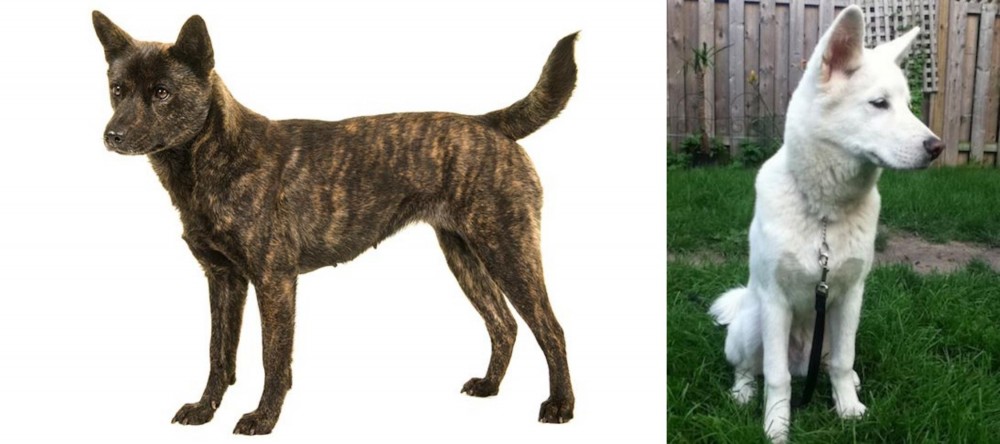 Kai Ken is originated from Japan but Phung San is originated from North Korea. Both Kai Ken and Phung San are having almost same height. Kai Ken may weigh 8 kg / 17 pounds lesser than Phung San. Both Kai Ken and Phung San has almost same life span. Kai Ken may have less litter size than Phung San. Both Kai Ken and Phung San requires Moderate Maintenance.
Kai Ken is originated from Japan but Phung San is originated from North Korea. Both Kai Ken and Phung San are having almost same height. Kai Ken may weigh 8 kg / 17 pounds lesser than Phung San. Both Kai Ken and Phung San has almost same life span. Kai Ken may have less litter size than Phung San. Both Kai Ken and Phung San requires Moderate Maintenance.
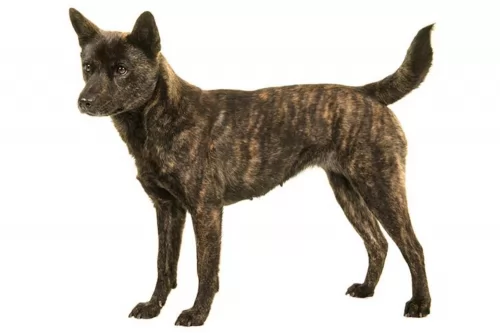 The Kai Ken dog hails from Japan and is both an ancient and rare dog. In fact the dog was discovered in 1929 in the Kai province near Mount Fuji. The dog has the nickname Tora Inu in Japan which means 'Tiger Dog'. Maybe its got to do with the brindle striped coat or his bravery.
The Kai Ken dog hails from Japan and is both an ancient and rare dog. In fact the dog was discovered in 1929 in the Kai province near Mount Fuji. The dog has the nickname Tora Inu in Japan which means 'Tiger Dog'. Maybe its got to do with the brindle striped coat or his bravery.
He falls into the working class category. In 1931, the Kai Ken Aigokai registry was formed to preserve the dog. In fact in this year Dasuke Adachi discovered these dogs and in 1934 was actually designated a Natural Monument in Japan and also protected by law.
The Kai Ken was recognized in 1934 by the Japanese Kennel Club. It is not 100% certain but it is thought that the dog was brought to the United States in the 1950s.
 The Phung San, Pungsan or ‘Poongsan dog’ is native to Korea. Outside of Korea, this dog is virtually unheard of.
The Phung San, Pungsan or ‘Poongsan dog’ is native to Korea. Outside of Korea, this dog is virtually unheard of.
The origin of the dog goes back to the 16th century, but there aren’t many records of where the breed descended from. Some dog experts believe the breed descends from Siberian Laika dogs while others say they are a mix of Mastiff and Herding breeds. It is believed that the Pungsan has been used for hunting large predators.
It was during the Japanese occupation of North Korea that the breed was declared a national treasure.
The Phung San isn't recognized by any major kennel clubs.
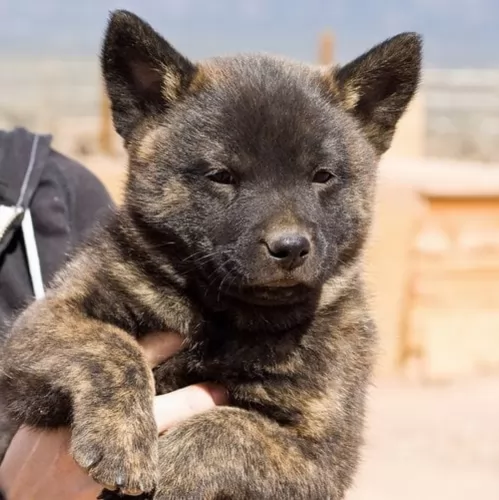 The Kai Ken has always been used for hunting purposes. He comes as recommended for hunting people and those who are active.
The Kai Ken has always been used for hunting purposes. He comes as recommended for hunting people and those who are active.
It is a medium sized dog standing at between 43 to 56cm in height both male and female and weighing between 14 and 22kg.
The ears of the dog are erect, the muzzle is fairly tapered and the nose is black. The tail is bushy like that of a fox and curls over the back. The double coat of the dog is of medium length and harsh and is a brindle color in a reddish or black shade.
Puppies are born black and then the brindle stripe-like pattern comes in later. He has an athletic body and is a keen swimmer.
The Kai Ken is an intelligent dog, loyal to his human family while being somewhat reserved around strangers. They are amicable with both children in the home as well as other pets.
He is a friendly, intelligent dog, forming close bonds with his family. Have him trained and socialized and he'll make you a splendid pet who will be willing to guard you if anyone threatens.
One look at that bright face and you can see that he is an intelligent, independent dog. He is also courageous and fearless and makes a great watchdog, especially because he is naturally reserved and suspicious with strangers.
 This is a Spitz-type dog and it is considered to be medium to large size. He is an athletic, muscular dog with a deep chest standing at 57 to 60cm in height and weighing roughly between 25 and 30kg.
This is a Spitz-type dog and it is considered to be medium to large size. He is an athletic, muscular dog with a deep chest standing at 57 to 60cm in height and weighing roughly between 25 and 30kg.
The legs are nice and straight, the ears erect and the bushy tails curls up over the back.The head is fairly triangular in shape, the nose is black and the eyes are brown, bright and alert.
The coat is thick and comes in different shades of white and cream.
These dogs are such loyal, devoted pets. They’re independent dogs and will benefit from being trained and socialized. With this kind of training they can get on well with children in the home. They can be quite snooty with strangers but they’re good watchdogs.
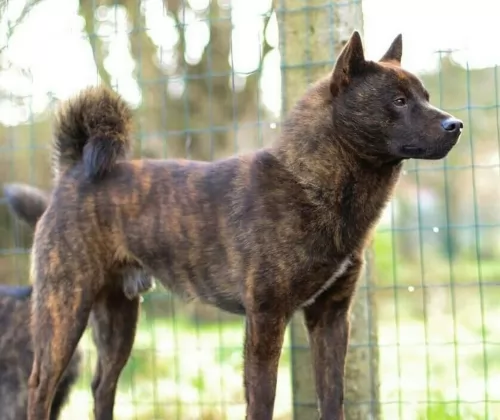 The Kai Ken is a working- and hunting dog, so he is used to being active and will want a home where he can be played with and exercised regularly.
The Kai Ken is a working- and hunting dog, so he is used to being active and will want a home where he can be played with and exercised regularly.
He can be slightly stubborn and independent so training and socialization are imperative. This is also because the dog’s curiosity and his athletic skills can lead to trouble if he isn’t properly trained.
Treat him the way he deserves and you’ll see that he is able to develop a strong bond with you and be altogether an excellent family pet.
 Your Phung San dog is a strong-willed dominant type of dog, and training and socialization will do him the world of good in terms of making him obedient and well mannered. He is loyal, faithful and loving and protects and guards those he loves.
Your Phung San dog is a strong-willed dominant type of dog, and training and socialization will do him the world of good in terms of making him obedient and well mannered. He is loyal, faithful and loving and protects and guards those he loves.
Some people say these dogs aren’t a good choice for novice dog owners, but dogs essentially turn out the way their owners are. The right upbringing will ensure your Pungsan Dog is a good pet for new owners and for families with children.
Do research and you’ll see that these beautiful dogs make splendid pets and companions.
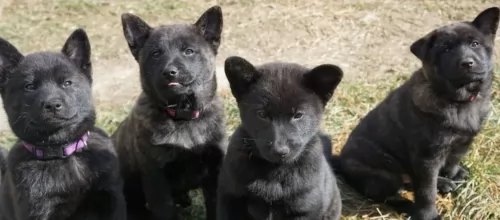 With a lifespan of 14 to 16 years, and given the genetic purity of the Kai Ken, you aren't likely to battle with congenital health problems with your dog, but it is always good to be aware of certain minor health issues that he could succumb to.
With a lifespan of 14 to 16 years, and given the genetic purity of the Kai Ken, you aren't likely to battle with congenital health problems with your dog, but it is always good to be aware of certain minor health issues that he could succumb to.
He can suffer from a few common dog diseases such as progressive retinal atrophy or hip dysplasia.
This is a disease of the eye where there is wasting of certain parts, and in this case the cells of the retina develop abnormally. This can eventually lead to blindness. It’s an inherited disease that can occur in pure- and mixed breeds, and dogs with PRA shouldn’t be used for breeding.
It isn’t a painful condition, and the first symptom usually noticed in a dog is night blindness where you may notice him bumping into things at night and being reluctant to walk around in the dark.
 Able to get to 13 or 14 years of age, the Pungsan dog enjoys good health, but there are some dog diseases that it is good to be aware of -
Able to get to 13 or 14 years of age, the Pungsan dog enjoys good health, but there are some dog diseases that it is good to be aware of -
Hip Dysplasia can mean no more games for your pet. It’s a disease that can have a large impact on your pet’s quality of life. It’s not reserved for old dogs either but it affects medium to large breed dogs.
Diet, weight of dog, genetics and environmental factors can all cause hip dysplasia, and while the symptoms are often subtle at first, you’ll see a limp starting and your dog holding his leg up off the ground. The severity of symptoms can change from day to day but the pain can be severe and you will need to get your pet to the vet.
This is an eye problem where the eyelids roll too far inwards and then scrape on the surface of the eye, possibly leading to corneal scarring and painful eye infections.
This is a life threatening illness where the stomach bloats up with gas and the stomach can actually twist. Your pet will be restless, panting and acting out of character and absolutely no time should be wasted getting your pet to the vet.
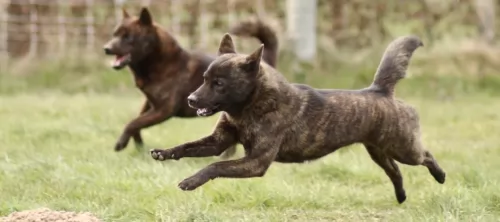 Even though the coat is thick, the Kai Ken will require basic canine care, so a brush twice a week will be enough to keep the coat free of loose hair. He sheds more heavily a couple of times a year and then he will require more brushing.
Even though the coat is thick, the Kai Ken will require basic canine care, so a brush twice a week will be enough to keep the coat free of loose hair. He sheds more heavily a couple of times a year and then he will require more brushing.
He has always been used to hunt so he is a dog that will require regular exercise such as walks, hikes, swimming and ball games.
The nails of the dog should be trimmed regularly once they become long as long nails can be hazardous and can hook onto things, causing injury to the nail area.
The ears of the dog should be checked regularly for fleas and ticks, and teeth should also be brushed with canine toothbrush and toothpaste.
 This is an active, energetic dog that will require some vigorous physical activity each day. While a walk is an excellent form of exercise, he will need something more hectic. You can take him to the park and allow him to run free off his leash, take him with you on your hikes and play ball- or frisbee games with him.
This is an active, energetic dog that will require some vigorous physical activity each day. While a walk is an excellent form of exercise, he will need something more hectic. You can take him to the park and allow him to run free off his leash, take him with you on your hikes and play ball- or frisbee games with him.
Your Pungsan sheds quite a bit because the fur is thick and you will need to have him brushed at least twice a week. Turn this brushing session into a proper grooming session. There are several things to check during these brushing sessions which your pet will love -
Run your hands over him and check for any unusual lumps.
Look inside his mouth and check his teeth. Your pet can’t tell you that there is a rotting tooth causing tremendous pain and illness.
Check the inside of his ears and make sure they aren’t red and clogged with excess wax and debris. There are ways to clean them and if you don’t know how or you don’t want to, allow a professional groomer to check his teeth, inside his ears and also trim his nails.
Make sure he has an excellent diet. There are some really good commercially manufactured dog foods that have the right balance of vitamins and minerals in them. Give him some home-made food too. Nothing exotic and spicy – just wholesome, simple food that won’t upset his stomach – boiled chicken, brown rice or pasta and some sweet potato, carrots and spinach. Mix these into his kibble from time to time. Once in a while you can also give him some raw meat. Make sure he has easy access to fresh, cool water.